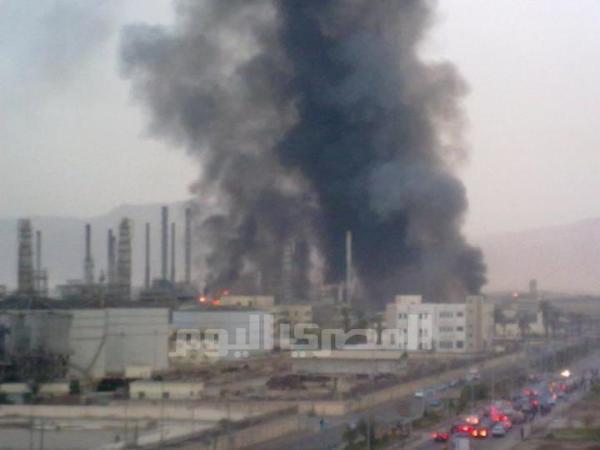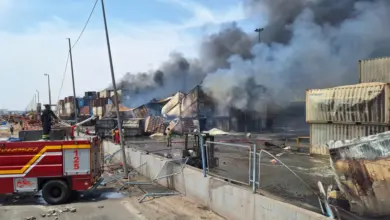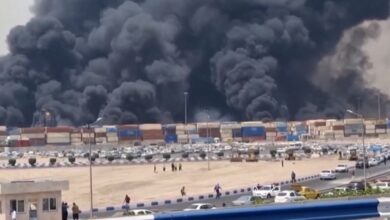
Suez citizens experienced a terrifying four days when a series of huge fires erupted 14 April at the Nasr Petroleum Company in Suez, leaving two dead and dozens injured.
The half million citizens of the seaport city woke up to the loud sound of blasts that rocked the city in the early hours of the morning, covering its sky with a big black cloud easily seen from miles away.
In addition to setting back Egypt’s already flagging economy, the fire could also cause serious environmental and health problems.
Firefighting squads alongside deployed military and air forces extinguished the blaze after a tough battle that continued for hours, as subsequent oil tanks continued to explode intermittently.
Authorities announced last week that they had successfully put out the fire that broke out in the company’s five main oil refineries, but the catastrophe resulted in the death of two workers and the injury of 72 others, according to the Health Ministry, as well as financial losses estimated at LE10 million.
The cause of the fire at this state-owned company is still unknown. However, many speculations blamed a third party for causing it, pointing fingers at members of the Mubarak regime in particular.
Company CEO Hany Dahy ruled out the possibility of arson but confirmed he is waiting for the results of the prosecution’s investigation, which is underway to determine the cause of the fire. According to company officials, the blaze burned up about 10,000 tons of crude oil, or 20 percent of the company’s capacity.
The head of the People’s Assembly Human Rights Committee called for the formation of a fact-finding committee to investigate the cause of the fire, while members of the Shura Council took a step further and demanded the cabinet resign.
This is the second fire at an oil company in Suez since February, when five workers died and 24 were injured.
“The company, along with its facilities and products, is completely insured. The company’s administration had taken out an insurance policy against riots, sabotage and fire,” Dahy said.
Environmental science professor Azza Ibrahim said the fire is considered especially dangerous because the company is located in the middle of the city.
“Pollutants from burnt crude oil have hazardous effects on both air quality and human health, the by-products of the petroleum burning cause pollution in the soil and air, and oil fires have been linked with respiratory and skin disorders,” Ibrahim told Egypt Independent.
Concerned by the proximity of the fire only 7 km away from the city center, many nearby residents evacuated their homes in spite of the messages of reassurance from the ministry. Many schools evacuated students as well.
“There is no need for people to evacuate their homes, given that the oil company is far away from the homes,” the Interior Ministry’s media department said.
However, Brigadier General Sayed Qotab, director of the Suez environmental affairs department, downplayed any permanent effects on the environment.
“Luckily, the intensity of the heat and flames pushed the big smoke cloud into very high levels that exceeded the level of buildings in Suez. The wind in this area takes the fumes toward the south, away from Suez urban area,” Qotab said.
Environmental experts were concerned about the drainage of water used in the firefighting process, fearing it would be saturated with chemical components that would contaminate the fresh water once it is disposed in the Suez Canal.
But Qotab confirmed that the water drainage will not present any risk to the water or the marine environment.
“The water is normal and will not harm the environment, as there is no evidence of added chemical materials,” Qotab said.
Four days of firefighting efforts left nearby streets flooded with tens of thousands cubic feet of water.
Salwa al-Sherbiny, a resident originally from Suez who lives in Cairo, told Egypt Independent that she was horrified by the news and immediately called her brother, who lives in Suez.
“The news broke out on all social media — my son found out from Twitter that people in Suez were reporting a big smoke cloud was covering the sky, with alarm warnings issued from all mosques in the region,” she said.
She did not find any coverage of the event on TV because all channels were focusing on the Presidential Elections Commission decision to bar 10 candidates from the upcoming race.
For the past few months, Egypt has been suffering from drastic fuel shortages, and scenes of vehicles lining up in front of gas stations have become common.
However, Petroleum Minister Abdullah Ghorab declared that the fire has not affected the amount of diesel fuel on the market, also announcing the formation of a technical committee to determine the cause of the explosion.
In January 2011, Suez was among the first cities to hold major protests against the government of Hosni Mubarak and was the scene of the first fatality of the uprising. The port city is aslo a gatekeeper for the Suez Canal, which generates millions daily in revenue for the country.




